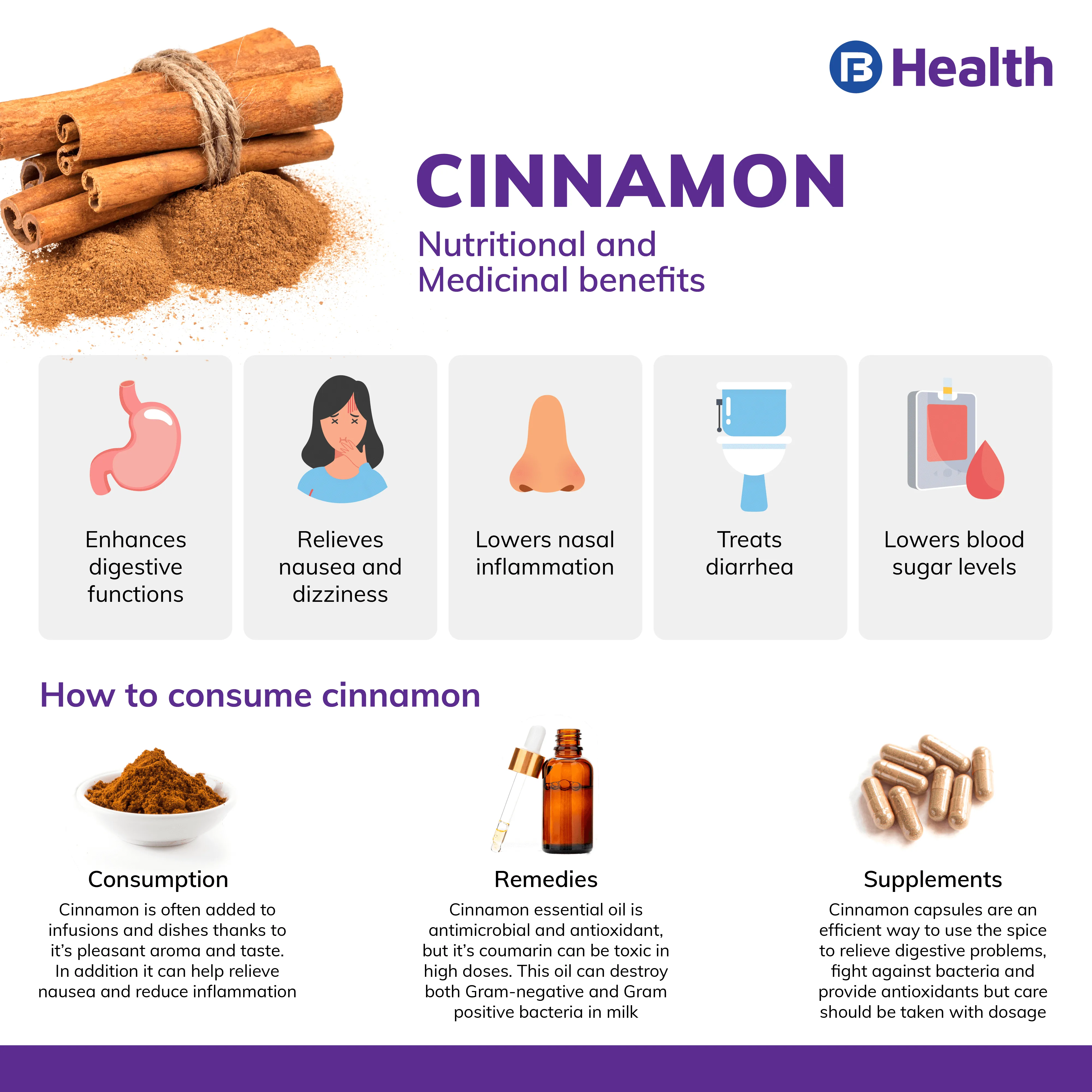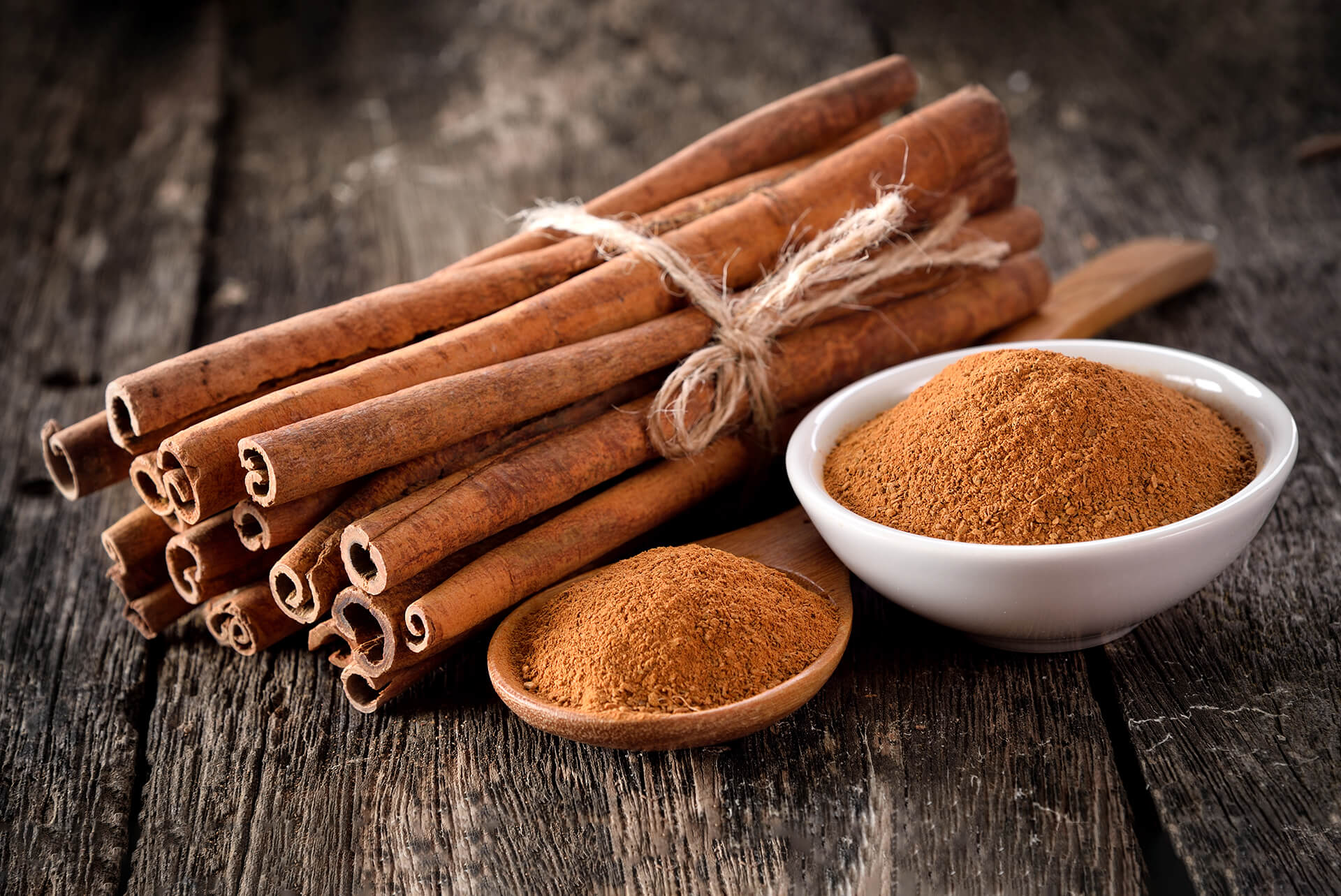Nutrition | 5 min read
Do You Know the Nutritional Value of Cinnamon? Here's Why It’s Important!
Medically reviewed by
Table of Content
Key Takeaways
- Cinnamaldehyde, a compound, offers a distinct flavour and smell to cinnamon
- Nutritional value of cinnamon powder supersedes the bark in oral consumption
- Cinnamon is used in the production of essential oils and medicinal ointments
Did you know that cinnamon has been in use since 2000 BC? It was used in the treatment of cough, sore throat and ailments like arthritis. In countries like Egypt, it was used in the embalming process. Though a pinch of this spice can provide relief for a diverse set of health conditions, there were ruthless rulers who burnt large quantities of the same to withhold general masses from consuming it. The world over, Dalchini or Cinnamon is a kitchen favourite and available in its whole, bark or powder form. Its use is widespread in the making of essential oils as well as other supplements.
As per some studies, cinnamon contains anti-inflammatory, antimicrobial and antioxidant properties that aid in safeguarding against cardiovascular diseases and cancer, among others. However, there is a need for additional evidence to support the benefits of cinnamon.
Over the centuries, cinnamon has been a prized possession due to its preservative qualities, especially for meat and related products. When it comes to cinnamon powder nutrition facts, it is good to know that a teaspoon of ground cinnamon (2.6 g) contains:
- Calcium: 26.1 mg
- Carbohydrates: 2.1 g
- Calories: 6.0 g
- Potassium: 11.2 mg
- Phosphorous: 1.66 mg
- Iron: 0.21 mg
- Vitamin A: 0.39 microgram
- Magnesium: 1.56 mg
Also, dried cinnamon stick calories have been estimated at 5g by experts.
Types of cinnamon
Cassia and Ceylon are the two primary types of cinnamon, albeit with different nutritional profiles. While Ceylon cinnamon originates from Sri Lanka, Cassia is grown in many parts of southern China. The price of the latter is far lower than the former.
Cinnamon nutritional information and general uses
Antioxidants are known to lower oxidative stress and help avert ailments such as type 2 diabetes, cancer and more. As a spice, cinnamon contains antioxidants like alpha carotene, bete cryptoxanthin, beta-carotene, lycopene, zeaxanthin and lutein. Moreover, it has anti-viral, anti-bacterial and anti-fungal properties. Cinnamon is also a useful source of manganese and contains small amounts of calcium and fibre. However, just a pinch of cinnamon is commonly used in the preparation of food. So, the nutritional value of cinnamon may not be experienced by you in its full capacity.
Cinnamon is also an excellent remedy for weight loss. Add half a teaspoon of the spice to a glass of lukewarm lemon water with honey and consume it first thing in the morning. You can experience the results in a few weeks with continued use.

How can cinnamon benefit you?
Cinnamon’s unique flavour and smell comes from cinnamaldehyde, an essential organic compound present in the bark. The spice is considered to have calming and healing properties. Some of the prominent benefits of using cinnamon frequently are given below.
Treats fungal infections
Dalchini or Cinnamon oil can help treat some types of fungal infections. For example, candida, which adversely impacts the bloodstream.
Enhances overall gut wellbeing
Prebiotic properties of spices such as cinnamon aid growth in beneficial bacteria and restrict pathogenic bacteria. It is essential to include such spices and herbs in the daily preparation of food and thereby improve your gut strength.
Anti-inflammatory
Polyphenol antioxidants are mostly present in spices and herbs and can prevent the onset of any disease in your body. Moreover, the antioxidants are also known to be anti-inflammatory. Cinnamon is supposed to contain significant amounts of the same.
Lower risk of blood sugar and type 2 diabetes
Cinnamon is considered to have a reasonable effect on the glycemic index and aiding the management of type 2 diabetes. However, research is still ongoing to definitively prove the spice’s ability for helping diabetics. Nevertheless, you can safely use a small portion in baking or breakfast or as part of a balanced diet.
Additional Read: Difference between Type 1 and Type 2 DiabetesInhibit Alzheimer’s disease
As per researchers, an extract present in cinnamon bark has properties that may help in preventing the onset of Alzheimer’s disease. If future studies can prove cinnamon’s effectiveness, it can be considerably useful for innovating therapies to treat the condition.
Cinnamon’s use in correcting digestive imbalance
Described as a carminative, cinnamon has been used to treat gastrointestinal issues due to its anti-microbial and digestive properties. Traditional Ayurveda practices use cinnamon bark oil for digestive problems and flatulence. Interestingly, the warmth of cinnamon is expected to enhance blood oxygen levels and raise blood flow and thereby ward off ailments and illnesses. As a remedy for gastronomical symptoms, you can add powdered cinnamon to a hot drink and consume.
How to store and consume cinnamon
For retaining the freshness of cinnamon, it is good to store it in an airtight container. Although whole cinnamon can last for nearly a year, powdered cinnamon can lose its potency within a few months.
Cinnamon crêpes with banana, raspberries and nut butter; porridge; cinnamon salmon with harissa yogurt and couscous are some droolworthy recipes to try out. It also helps to understand cinnamon roll nutrition facts. This contains about 234 g calories, 6.8 g fat, 3.8 g protein and 40 mg calcium.
Tips for adding cinnamon to your diet
- For a low sugar treat, add cinnamon to your waffle or cold coffee.
- Cinnamon can be sprinkled over oatmeal as a replacement for sugar.
- A dash of this spice in breads, applesauce, cakes or cookies can considerably enhance the flavour.
Moderate consumption of cinnamon is safe. This is because cinnamon contains coumarin, a natural flavouring that has the tendency to trigger warfarin, which is known as a common blood-thinning drug. Higher usage of cinnamon can have adverse effects on the liver and impact coagulation. Hence, it is vital to speak to your physician before adding the spice to your diet.
Now that you know the nutritional value of cinnamon, get the best advice on what spices to use to enhance your food and in what proportion through the right medical experts. You can easily book consultations with doctors near you on Bajaj Finserv Health. Schedule in-person appointments or video consultations in minutes. Also gain access to health plans and avail discounts and deals from partner clinics and labs.
References
- https://www.eatthismuch.com/food/nutrition/dried-cinnamon-stick,464848/
- https://www.ncbi.nlm.nih.gov/pmc/articles/PMC3030596/
- https://www.ncbi.nlm.nih.gov/pmc/articles/PMC5028442/
- https://www.hindawi.com/journals/ecam/2014/642942/
Disclaimer
Please note that this article is solely meant for informational purposes and Bajaj Finserv Health Limited (“BFHL”) does not shoulder any responsibility of the views/advice/information expressed/given by the writer/reviewer/originator. This article should not be considered as a substitute for any medical advice, diagnosis or treatment. Always consult with your trusted physician/qualified healthcare professional to evaluate your medical condition. The above article has been reviewed by a qualified doctor and BFHL is not responsible for any damages for any information or services provided by any third party.



